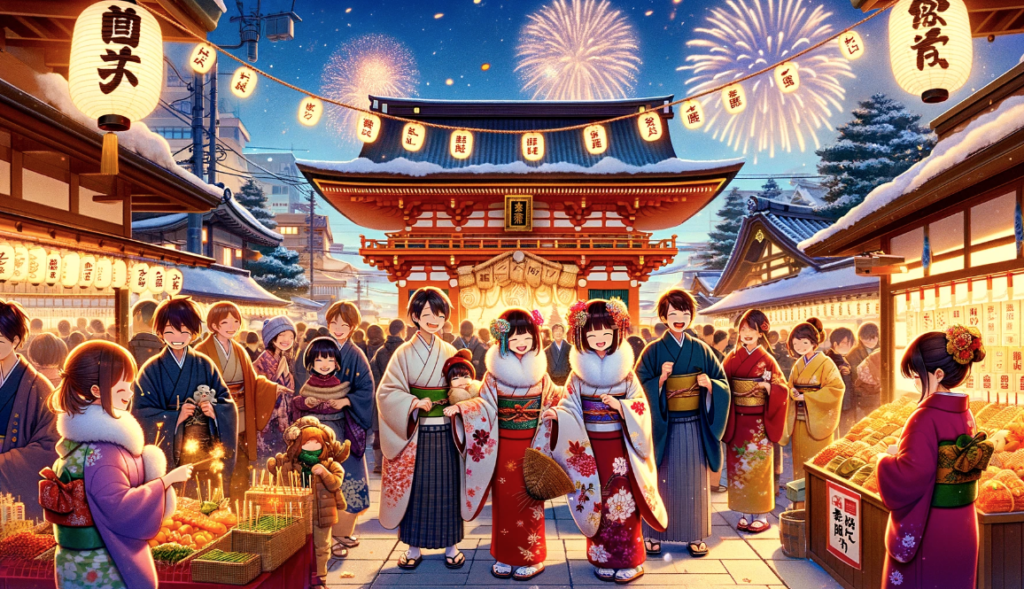
Lesson 3. New Year’s Day
Topic Question: How do Japanese people celebrate New Year’s Day?
No. 1
First, try answering the question yourself. – The instructor will provide advice on vocabulary, grammar, and expression corrections.
Sample Answer – Let’s read aloud – The instructor will check your pronunciation and accent.
New Year’s Day, or “Shogatsu,” is one of the most important holidays in Japan, celebrated with various traditions and customs. Japanese people typically start the celebrations by eating “toshikoshi soba” on New Year’s Eve, symbolizing the crossing over from the old year into the new and hoping for a long life. On New Year’s Day, many visit shrines or temples to pray for good fortune in the coming year, a practice known as “hatsumode.” Families gather to enjoy “osechi-ryori,” special dishes prepared for the New Year, each with symbolic meanings for health, happiness, and prosperity. Homes are decorated with “kadomatsu” and “shimekazari” to welcome spirits of ancestors and bring good luck. The New Year is also a time for giving “otoshidama,” money gifts to children, enveloped in special decorative pouches.
No. 2
5 Words to Learn and Their Meanings – Pronounce the Words Correctly (Pronunciation Training) + Make Sentences Using the Words Instantly
1. Traditions (伝統): The transmission of customs or beliefs from generation to generation.
We uphold our family traditions every Christmas by baking cookies and singing carols together.
2. Fortune (運命): Chance or luck as an external, arbitrary force affecting human affairs.
Many people wear lucky charms in hopes of improving their fortune.
3. Prosperity (繁栄): The state of being prosperous; wealth or success.
The country’s economy was booming, leading to greater prosperity for its citizens.
4. Ancestors (先祖): A person, typically one more remote than a grandparent, from whom one is descended.
I often wonder about the lives of my ancestors and the challenges they faced.
5. Pouches (袋): Small bags or sacks for carrying small objects.
I keep all my coins in a small leather pouch.
No. 3
Key Expressions and Example Sentences – Pronounce the Example Sentences of Key Expressions Correctly (Pronunciation Training) + Make Sentences Using the Key Expressions Instantly
1. Crossing over (越える)
The bridge represents crossing over from hardship to a place of safety and comfort.
2. Pray for good fortune (幸運を祈る)
At the beginning of each year, I pray for good fortune for my family and friends.
3. Symbolic meanings (象徴的な意味)
The ring is often seen as having symbolic meanings of unity and eternity in marriage ceremonies.
No. 4
Discussion and Exchange of Opinions on the Sample Answer
Instructor: Do you have a particular tradition that resonates with you?
Student: [Opinions of students]
No. 5
Free Discussion on the topic
Let’s talk about the importance of New Year celebrations around the world. How do different cultures reflect their values and hopes for the new year through their traditions? What unique New Year customs have you experienced or heard about that you find interesting or meaningful?






